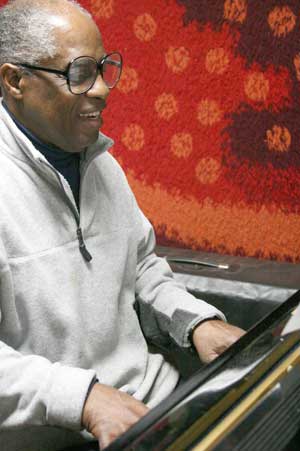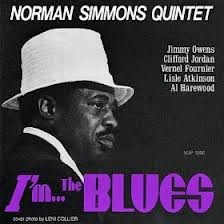Good Humors – Norman Simmons
A laid-back, supremely cool swing from Norman Simmons. Lead sheets and second parts available.
- Recording: Norman Simmons - I'm . . . The Blues
- Recorded on: December, 1981
- Label: Milljac (MJP 10002)
- Concert Key: F
- Vocal Range: , to
- Style: Swing (medium)
- Trumpet - Jimmy Owens
- Alto Sax - Clifford Jordan
- Piano - Norman Simmons
- Bass - Lisle Akinson
- Drums - Vernel Fournier
0:00
0:00
Buy MP3
Video
- Description
- Historical Notes
- Solos
- Piano Corner
- Bass Corner
- Drum Corner
- Guitar Corner
- Inside & Beyond
- Minus You
Quirky and stylish, Good Humors is sure to get you in the best of moods. The combination of a repeating two-measure rhythmic bass pedal figure with the call and response melody yields drama and excitement. Norman has revealed that the inspiration for the bass figure grew out of a Vernel Fournier rhythmic bass drum pattern (see our Historical Notes). Although our audio excerpt might sound like the start of the arrangement, it's not. The bass line is elongated into four-measure phases to start the introduction; the entrance of the melody is a surprise. The bridge swings, then it's back to call and response. The Concert Condensed Score has all the info for rhythm section players.
Good Humors definitely has some of Norman's slick "Chicago" roots in it, along with a bit of New Orleans. Norman's long time buddy, New Orleans drummer Vernel Fournier, keeps it in a tasty groove; his playing inspired the rhythmic figure that underlies the composition. From Norman Simmons: "This was Vernel. We used to call Vernel "Good Foot" Fournier, because of the way he played his bass drum. So this lick rhythm, that was Vernel. The melody was based on Vernel's foot. And that hit on 4—that's strictly New Orleans."
Norman always picks the right sidemen. Vernel is also perfect for Los Milagros Pequenos from the same album. It has a "Poinciana-Ahmad Jamal" flavor, similar to the famous rhythmical impetus that Vernel put on Ahmad Jamal's 1958 recording of Poinciana, a big hit. Vernel was actually developing these rhythmic patterns earlier on different songs with Norman, as Norman's 1956 Argo session demonstrates: listen to Norman's Jan .
.
Norman Simmons writes great compositions in many styles. From the same album, check out Slumberettes, with the equally tasty Al Harewood on drums—a totally different and beautiful vibe.
Speaking of great sidemen, Norman said "This was the first time that Clifford Jordan was recorded on alto saxophone." You'll learn more about Clifford Jordan and his music soon, at jazzleadsheets.com.
Norman always picks the right sidemen. Vernel is also perfect for Los Milagros Pequenos from the same album. It has a "Poinciana-Ahmad Jamal" flavor, similar to the famous rhythmical impetus that Vernel put on Ahmad Jamal's 1958 recording of Poinciana, a big hit. Vernel was actually developing these rhythmic patterns earlier on different songs with Norman, as Norman's 1956 Argo session demonstrates: listen to Norman's Jan
Norman Simmons writes great compositions in many styles. From the same album, check out Slumberettes, with the equally tasty Al Harewood on drums—a totally different and beautiful vibe.
Speaking of great sidemen, Norman said "This was the first time that Clifford Jordan was recorded on alto saxophone." You'll learn more about Clifford Jordan and his music soon, at jazzleadsheets.com.
Related Songs
Email Send Good Humors to a friend
Send this page to a friend via email. Add your name or email in the first field. In the second, add one or more email addresses, separated by a comma.

Norman Simmons
October 6, 1929 – May 13, 2021
Accomplished soloist, accompanist, composer and educator, Norman Simmons is well known as a pianist with an great ability to connect with jazz singers. Born in Chicago, Simmons taught himself piano and at age sixteen enrolled in the Chicago School of Music. He formed his own group in 1949 and began recording in 1952 when he worked as a house pianist for Chicago clubs The BeeHive and the C&C Lounge. During this period, his first recordings were under the leadership of tenor saxophonists Claude McLin, Paul Bascomb and Coleman Hawkins. Read more...
There was a problem.
...

